Root:
ش ط ن
Words from this Root in the Grand Qur'aan:
a) Total occurrences: 88 [85
occurrences for famous Devil and 3 occurrences as Cobra snake]
b) No of constructions: 12
| 1. Perception and meanings mentioned
in Lexicons. 2. Representative of
Species Jinn named Ieb'lees
is characterized by specific name
 subsequent to exposure of his distinctive
qualities of mind and feeling.
subsequent to exposure of his distinctive
qualities of mind and feeling.
3.
Cobra is also identified by
the name
 . .
|
We find the following about this Root in the
Classic Lexicons:-
Ibne Faris [died 1005]
(شطن)
الشين والطاء والنون أصلٌ مطّرد صحيح يدلُّ على البُعد.
والشَّطَن: الحَبْل. وهو القياس، لأنَّه بعيدُ ما بينَ الطَّرَفين.
وَأمَّا الشَّيطان فقال قوم: هو من هذا الباب، والنون فيه أصليّة، فسُمِّي
بذلك لبُعده عن الحقّ وتمرُّده. وذلك أنّ
كلَّ عاتٍ متمرّدٍ من الجنّ والإنس والدوابّ شيطان
وقيل إنّه أرادَ الحيّات: وذلك أنَّ الحيَّة تسمَّى شيطاناً
Lisan
al-`arab
والشيطانُ: حَيَّةٌ له عُرْفٌ.
Taj
-al-`arus
(و)
الشيطانُ:(الحيَّةُ) و قِيل: نوعٌ من الحيّاتِ له عُرْفٌ قبيح
المنْظر; و قيل: هي حيَّةٌ رقيقة خفيفة
Edward
William Lane's Arabic-English Lexicon, based on the classical Arabic
lexicons such as those above
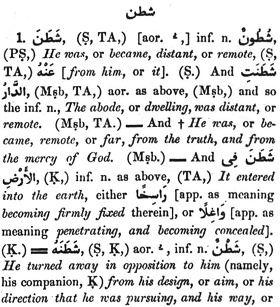
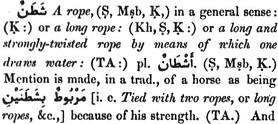
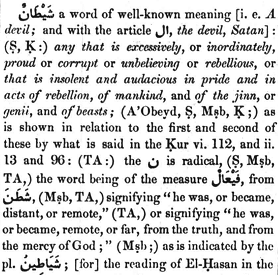
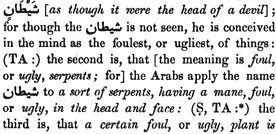
The basic perception infolded in the Root is that
of becoming something distant or remote. It is therefore primarily a relational word-Root since one thing gets distant
and remote in relation to another thing. It is used to refer
particularly to a long Rope perhaps with an understanding that its two ends
are turned distant away from each other. It is used by Arabs to refer to
a snake for reason that it turns distant away from men. It is also said
that it is one species amongst snakes which is odious in view.
3. Cobra is also identified by
the name
 .
.
The Grand Qur'aan has confirmed that the word:
 was and is used by Arabs to refer to Cobra, a peculiar species of
snakes.
was and is used by Arabs to refer to Cobra, a peculiar species of
snakes.



-
Those who devour incremental gains on
lent money/capital
they endeavour-stand
not except just like the standing of that person whom Cobra transforms
[خَابِطٌ]
confounded-diplopic, caused by bite.
-
This parable for their transformation is for the reason
that they said to people;
"The
credit sale is
just like the extra gain charged on lent money/capital; usury";
-
Realize the difference and distance
between two; Allah the Exalted has declared
the credit sale as permissible and
has prohibited the incremental gain/usury on lent money/capital.
[Refer 2:275]
 Verb:
Imperfect; third person; singular; masculine; Mood: Indicative [Form-V]; Suffixed Fronted Object pronoun, in accusative state;
مصدر-تَخَبُّطٌ
Verbal Noun. Form-V verbs have transformative meanings.
The basic perception conveyed by this state, as was mentioned by Ibne
Faris [died-1005] and Lane's Lexicon is tramping;
going or journeying without direction, or one who beats the ground with
his foot and know not in what land he is going; either because of the
darkness or because he is blind. It is a
confusion-directionless state. The subject of Verb causing this state
through physical touch/bite is
Verb:
Imperfect; third person; singular; masculine; Mood: Indicative [Form-V]; Suffixed Fronted Object pronoun, in accusative state;
مصدر-تَخَبُّطٌ
Verbal Noun. Form-V verbs have transformative meanings.
The basic perception conveyed by this state, as was mentioned by Ibne
Faris [died-1005] and Lane's Lexicon is tramping;
going or journeying without direction, or one who beats the ground with
his foot and know not in what land he is going; either because of the
darkness or because he is blind. It is a
confusion-directionless state. The subject of Verb causing this state
through physical touch/bite is
 .
The reason for exemplification specifies that they see and describe two
different things as identical and similar in nature. The Cobra bite also
renders its victim in confusion and
diplopic.
.
The reason for exemplification specifies that they see and describe two
different things as identical and similar in nature. The Cobra bite also
renders its victim in confusion and
diplopic.




-
It is a fact that it: Az-Zaquem is a female tree.
It emerges in the bottom of Hell-Prison. [37:64]
-
The fruit bearing Spathe of her [feminine
tree] exemplifies alike if it
were the heads/hoods of Cobras. [37:65]
In this Unitary Verbal Passage, the
Spathe
of a specific
plant named:
 that grows in the base of Hell-Prison is
exemplified. Exemplification of an unseen
or unknown object is done to let the reader or listener perceive it by
mentioning its similarity with some object that is already in his
perception. The exemplification is never of two objects both of which
are not within the perception of the listener or reader. The listeners
and readers of Qur'aan have neither seen the tree
named:
that grows in the base of Hell-Prison is
exemplified. Exemplification of an unseen
or unknown object is done to let the reader or listener perceive it by
mentioning its similarity with some object that is already in his
perception. The exemplification is never of two objects both of which
are not within the perception of the listener or reader. The listeners
and readers of Qur'aan have neither seen the tree
named:
 nor have ever seen:
nor have ever seen:

 "the heads of the
Devil-".
Therefore, all such translations who ignored the
basic principle of exemplification denoted by
"the heads of the
Devil-".
Therefore, all such translations who ignored the
basic principle of exemplification denoted by
 are
patently incorrect,
notwithstanding our
acknowledgement of their scholarly skills.
are
patently incorrect,
notwithstanding our
acknowledgement of their scholarly skills.
Spathe as a part
of a plant is a well known object for human beings. It is also part of
Date-Palm, well known to Arabs, who were the first listeners and readers
of Qur'aan. Spathe of Date Palm has also some resemblance with the
head/hood of Cobra.
.jpg)
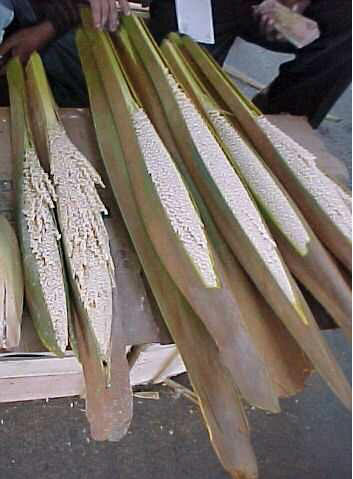
Cobra
Date Palm-Spathe
Away from Arabian
Peninsula, Men know about some plants, like Cobra Lilli,
Japanese Cobra Lily,
Arisaema nepenthoides-Eastern
Himalayan species, that have spathe closely resembling hoods of
Cobra.

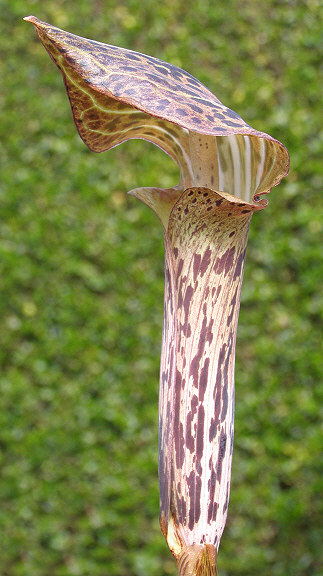

Japanese Cobra Lily
Arisaema nepenthoides
Cobra Lilli



-
Moreover, you
the Messenger
[Sal'lallaa'hoalaih'wa'salam]
mention Our Sincere
Allegiant, Ayub
[alai'his'slaam].
-
Mention this episode when he called
upon his
Sustainer Lord,
saying,
"It is a fact that I am in pain,
the
Cobra has bitten me causing fatigue and pain". [38:41]
In view of the fact that the word:
 does denote the snake/serpent and the effect of
its bite/touch reported as fatigue and pain left no room to interpret it
in the meanings of otherwise famous the Devil. The response from Allah
the Exalted not only further exposes this fact but also provides the
information as to the location/area where this incident had happened,
the desert. Allah the Exalted advised Ayub alahissalam to undertake this
treatment, first aid.
does denote the snake/serpent and the effect of
its bite/touch reported as fatigue and pain left no room to interpret it
in the meanings of otherwise famous the Devil. The response from Allah
the Exalted not only further exposes this fact but also provides the
information as to the location/area where this incident had happened,
the desert. Allah the Exalted advised Ayub alahissalam to undertake this
treatment, first aid.

-
Allah the Exalted responded, advising, "You prod the ground with your heel/foot. [he did it water came up].
-
This is
cleanser/cleansing location [to wash the wound to remove away venom].
It gives cooling-soothing effect
[pain reducing therapy]. It is
also drinkable". [38:42]
There are certain spots,
termed oasis
in the deserts where water-spring is available immediately below the
surface. He was asked to prod at that point with his heel/foot whereupon the water emerged thereat.
This shows us the location
of incidence of suffering fatigue and pain;
he was
somewhere in a desert [not home].
In oasis, the
water table is just beneath the ground surface.
On emergence of water, it was described as:
 [Passive Participle/Locative Noun]
a cleanser/cleansing
location.
The basic perception infolded in its Root "غ س ل" is
to wash with water,
signifying the removing of dirt, or filth or the like thereof by making
water to run over it resulting in cleansing/free
from unpleasantness-impurity. The peculiarity of that
washing water was described as
[Passive Participle/Locative Noun]
a cleanser/cleansing
location.
The basic perception infolded in its Root "غ س ل" is
to wash with water,
signifying the removing of dirt, or filth or the like thereof by making
water to run over it resulting in cleansing/free
from unpleasantness-impurity. The peculiarity of that
washing water was described as
 ,
masculine active participle, the one
that gives cooling-soothing effect. This is
important to note that the:
,
masculine active participle, the one
that gives cooling-soothing effect. This is
important to note that the:
 -a
cleanser water was qualified by an active participle-causer of coldness,
thus indicating that the water was
cold. [It
seems as if that particular cleanser had iodine content in it to make it
suitable disinfectant and wound-healer]. This is
the immediate first-aid prescribed for Cobra bite. Further
information about that water was its drinkable quality. Please take note
that it is only informative, he was not asked to drink it instantly.
However, this information must have prompted him to replenish his water
stock.
-a
cleanser water was qualified by an active participle-causer of coldness,
thus indicating that the water was
cold. [It
seems as if that particular cleanser had iodine content in it to make it
suitable disinfectant and wound-healer]. This is
the immediate first-aid prescribed for Cobra bite. Further
information about that water was its drinkable quality. Please take note
that it is only informative, he was not asked to drink it instantly.
However, this information must have prompted him to replenish his water
stock.
What was the purpose of identifying to him the
availability of a cleansing location containing cool water just underneath
the surface of ground? He did the act of
prodding with his heel, the water came up which he saw and thereby it was
referred by the Demonstrative pronoun
 .
He was asked to make use of this water for
cleansing
the wound to distance/flow away some venom to Earth.
.
He was asked to make use of this water for
cleansing
the wound to distance/flow away some venom to Earth.

-
[reverting from parenthetic to cobra bite treatment suggested]
And take hold with your
hand a [palm curved as bucket]
handful of
cleansing cool water,
thereby expose-separate
the bite-venom
with cool cleansing water. Mind it, you should not desist-deviate [this given
advice in quickly doing it]".
-
It is a fact that
We had found him coolly perseverant.
What a remarkable sincere servant was he!. It is a fact that he
was ever mindful/heedfully returning [to Allah the Exalted]. [38:44]
 Appositive/Conjunction particle. It links the following clause
with the verb
Appositive/Conjunction particle. It links the following clause
with the verb
 .
.
 Verb:
Imperative; second person; masculine; singular; Subject pronoun hidden; مصدر-أَخْذٌ Verbal
noun. This act, meaning to hold/take, was to be done after prodding the
Earth, which resulted in emergence of water in the small ditch/well made
with heel/foot.
Verb:
Imperative; second person; masculine; singular; Subject pronoun hidden; مصدر-أَخْذٌ Verbal
noun. This act, meaning to hold/take, was to be done after prodding the
Earth, which resulted in emergence of water in the small ditch/well made
with heel/foot.
 Prepositional
+ Possessive Phrase relates to verb: بـِ Inseparable
preposition
+ Noun:
Definite;
masculine; singular; genitive + Possessive pronoun: Second person;
singular; masculine; in genitive state.
Prepositional
+ Possessive Phrase relates to verb: بـِ Inseparable
preposition
+ Noun:
Definite;
masculine; singular; genitive + Possessive pronoun: Second person;
singular; masculine; in genitive state.
 :
It is a singular accusative noun, and is
apparently the object of preceding verb
:
It is a singular accusative noun, and is
apparently the object of preceding verb
 ,
linked and is subsequent to earlier act:
,
linked and is subsequent to earlier act:
 accomplished and result achieved in the shape of cleansing water. Its Root is: "ض غ ث".
The basic perception is to collect together. Whatever amount/quantity is collected together, and grasped with
the hand. The source, where water was available, was only of such nature
that could enable take from it only to the extent of handful/scoop of water.
It was a small ditch made with heel/foot. Only palm of hand curved as bucket could be put in to take
water from it.
accomplished and result achieved in the shape of cleansing water. Its Root is: "ض غ ث".
The basic perception is to collect together. Whatever amount/quantity is collected together, and grasped with
the hand. The source, where water was available, was only of such nature
that could enable take from it only to the extent of handful/scoop of water.
It was a small ditch made with heel/foot. Only palm of hand curved as bucket could be put in to take
water from it.
 : This
verbal sentence is
Prefixed with conjunction
فَ,
which shows cause and effect-logical sequence.
This signifies that the act hereinafter is to be
performed when the previous act is accomplished.
: This
verbal sentence is
Prefixed with conjunction
فَ,
which shows cause and effect-logical sequence.
This signifies that the act hereinafter is to be
performed when the previous act is accomplished.
 :
It
is an imperative
transitive verb.
The subject pronoun is hidden referring to
Ayub alahissalam.
The verb is transitive and it needs at
least one object. The mention of object was unnecessary since understood
to the person whom this advice was given.
It is evident for us also since the complaint of that person has been
mentioned prior to it in Ayah 38:41 that "when he called his Sustainer
Lord, that "I
[am in pain],
the Cobra has bitten me causing dizziness/weakness and pain".
It is obvious that no one advises for "beating-striking" the wound/bite
area with
anything,
except projecting-raising the point of bite for cleansing the
wound in depth to make some venom flow out to earth.
:
It
is an imperative
transitive verb.
The subject pronoun is hidden referring to
Ayub alahissalam.
The verb is transitive and it needs at
least one object. The mention of object was unnecessary since understood
to the person whom this advice was given.
It is evident for us also since the complaint of that person has been
mentioned prior to it in Ayah 38:41 that "when he called his Sustainer
Lord, that "I
[am in pain],
the Cobra has bitten me causing dizziness/weakness and pain".
It is obvious that no one advises for "beating-striking" the wound/bite
area with
anything,
except projecting-raising the point of bite for cleansing the
wound in depth to make some venom flow out to earth.
 This Prepositional
Phrase relates to the preceding verb: بـِ Inseparable
preposition; Personal Pronoun: Third
person; singular; masculine referring back to handful/scoop of water
taken in his hand.
This Prepositional
Phrase relates to the preceding verb: بـِ Inseparable
preposition; Personal Pronoun: Third
person; singular; masculine referring back to handful/scoop of water
taken in his hand.
The Cobra bite can be life
threatening if preventive measures are delayed, particularly when the
man is lonely in pain and distress. It was, therefore, emphasized upon
Ayub alahissalam:



"And mind it, you should not desist-deviate [this given advice in quickly doing it]".
 Appositive/Conjunction particle.
Appositive/Conjunction particle.
 Prohibitive Particle.
Prohibitive Particle.
 :Verb: Imperfect; Second person; singular;
masculine; Mood: Jussive;
intransitive; Subject pronoun hidden.
:Verb: Imperfect; Second person; singular;
masculine; Mood: Jussive;
intransitive; Subject pronoun hidden.
It seems
strange about those writers, otherwise
known as learned scholars, who preferred to depend upon conjectural
gossips of "oath of beating wife with hundred strokes" while translating
and explaining this Ayah/Unitary Verbal Passage of Qur'aan. Here such
writers, by their imaginative flight and under influence of irrational
and insulting
stories spread about the Elevated Messengers, "import into
desert" the object of
Verb
 as "the wife of you-Ayub alahissalam". They naively forget the agony,
fatigue, pain expressed by Ayub alahissalam, the cause of this feel of
pain and anxiety, the command of Allah the Exalted to prod the surface
of Earth with his heel, emergence of washing water, causer of cooling
and soothing effect. All this happened in the desert away from his home
and family.
as "the wife of you-Ayub alahissalam". They naively forget the agony,
fatigue, pain expressed by Ayub alahissalam, the cause of this feel of
pain and anxiety, the command of Allah the Exalted to prod the surface
of Earth with his heel, emergence of washing water, causer of cooling
and soothing effect. All this happened in the desert away from his home
and family.
It is all the
more strange that majority of writers also naively forgot that this
episode is mentioned earlier too:



"It is a fact that I am in pain,
the
Physical Adversity has touched me"
[Refer
21:83]




Whereupon We responded for him.
Thereby/for reason We removed that with which he
was in the state of pain and distress [by
telling about washing water and treatment-38:42].
And [saving him from life threatening incident] We gave him-let him meet his family,
and other like of family with them, for showing the mercy from Our Grace
[to all of them]. [21:84]
The Cobra bite to a person all
alone in the midst of desert, can cost him life. He was saved after
having experienced life threatening incident and went home. Not only his
family is mentioned but also other persons who are like the members of
family. It is understandable that the family and others having
similarity of family members must be worried about his non arrival. The
entire episode was reflection of the mercy of Allah the Exalted upon all
of them that a man bitten by Cobra has come back safe and sound. This
fact is again mentioned as parenthetic clause while describing the
incidence



-
And [saving him from life
threatening incident] We gave him-let him meet his family,
and other like of family with them, for showing the mercy from Our Grace
[to all of them].
-
And to make mention of this episode as a piece of advice for
men of wisdom who look into matters and conduct objectively without
overlapping it with emotions/prejudices/whims/conjectural fascinating myths.
Please ponder how ridiculous was the story
concocted by some earlier writers regarding "undertaking oath for beating
his wife". It is stated that she came late when she was called by him.
Thus, these so called scholars portrayed him as an exaggeratedly
impatient person. On the contrary, Allah the Exalted discloses this
observation about him:



It is a fact that
We had found him
coolly perseverant.
What a remarkable
sincere servant was he! It is a fact that he was ever
mindful/heedfully returning [to Allah the Exalted].
[Refer
38:44]
This is the observation of
Allah the Exalted about him. Do you think
[disregard for a moment
what the scholars have been gossiping all along; apply your own mind to
answer it] that a
coolly perseverant, a remarkable praiseworthy person can become so
impatient and emotional against his wife, deciding and taking oath to
beat her with hundred lashes, merely because she did not attend him
quickly when called? I know your answer. Therefore, start deleting from
the memory all irrational,
derogatory, non substantiated, irrational, conjectural stories. We must
remember, that attributing any thing of little import or irrational and
derogatory nature not becoming of the stature of elevated and dignified
persons, the Elevated Messengers of Allah the Exalted, is a great
slander and sin. Disregard the persons who might have attributed it.
| 1 |
 Noun:
Definite; Masculine; broken plural; nominative. (1)2:102(2)6:71 (3)26:210(4)26:221=4
اسم:معرفہ باللام مرفوع-جمع
مكسرمذكر Noun:
Definite; Masculine; broken plural; nominative. (1)2:102(2)6:71 (3)26:210(4)26:221=4
اسم:معرفہ باللام مرفوع-جمع
مكسرمذكر |
|
| 2 |
 Noun:
Definite; Masculine; broken plural; accusative.
(1)2:102(2)6:121 (3)7:27(4)7:30(5)19:68(6)19:83(7)38:37=7
اسم:معرفہ باللام منصوب
-جمع
مكسرمذكر Noun:
Definite; Masculine; broken plural; accusative.
(1)2:102(2)6:121 (3)7:27(4)7:30(5)19:68(6)19:83(7)38:37=7
اسم:معرفہ باللام منصوب
-جمع
مكسرمذكر |
|
| 3 |
 Noun:
Definite; Masculine; broken plural; genitive. (1)17:27(2)21:82(3) 23:97(4)37:65=4
اسم:معرفہ باللام -مجرورجمع
مكسر مذكر Noun:
Definite; Masculine; broken plural; genitive. (1)17:27(2)21:82(3) 23:97(4)37:65=4
اسم:معرفہ باللام -مجرورجمع
مكسر مذكر
|
|
| 4 |
 Proper Noun:
Definite; Masculine; singular; nominative.
(1)2:36(2)2:268 (3)2:275(4)3:155(5)3:175(6)4:38(7)4:60(8)4:120(9)5:91(10)6:43(11)6:68(12)7:20(13)7:27(14)7:175 (15)8:48(16)12:42
(17)12:100(18)14:22(19)16:63(20)17:27(21)17:64(22)18:63(23)20:120(24)22:52 (25)22:52(26)22:53(27)25:29(28)27:24(29)29:38(30)31:21
(31)38:41(32)43:62(33)47:25(34)58:19=34
Proper Noun:
Definite; Masculine; singular; nominative.
(1)2:36(2)2:268 (3)2:275(4)3:155(5)3:175(6)4:38(7)4:60(8)4:120(9)5:91(10)6:43(11)6:68(12)7:20(13)7:27(14)7:175 (15)8:48(16)12:42
(17)12:100(18)14:22(19)16:63(20)17:27(21)17:64(22)18:63(23)20:120(24)22:52 (25)22:52(26)22:53(27)25:29(28)27:24(29)29:38(30)31:21
(31)38:41(32)43:62(33)47:25(34)58:19=34
اسم:معرفہ باللام مرفوع-واحد
مذكر |
|
| 5 |
 Proper Noun:
Definite; Masculine; singular; genitive. (1)2:168(2)2:208(3) 3:36(4)4:76(5)4:76(6)5:90(7)6:142(8)7:200(9)7:201(10)8:11(11)16:98(12)24:21(13)24:21(14)28:15 (15)41:36(16)58:10
(17)58:19(18)58:19(19)59:16=19
اسم:معرفہ باللام
-مجرورواحد
مذكر Proper Noun:
Definite; Masculine; singular; genitive. (1)2:168(2)2:208(3) 3:36(4)4:76(5)4:76(6)5:90(7)6:142(8)7:200(9)7:201(10)8:11(11)16:98(12)24:21(13)24:21(14)28:15 (15)41:36(16)58:10
(17)58:19(18)58:19(19)59:16=19
اسم:معرفہ باللام
-مجرورواحد
مذكر |
|
| 6 |
 Noun:
Definite; Masculine; singular; accusative. (1)4:83(2)4:119(3)7:22(4) 12:05(5)17:53(6)17:53(7)19:44(8)19:44(9)35:06(10)36:60=10
اسم:معرفہ باللام منصوب
-واحد
مذكر Noun:
Definite; Masculine; singular; accusative. (1)4:83(2)4:119(3)7:22(4) 12:05(5)17:53(6)17:53(7)19:44(8)19:44(9)35:06(10)36:60=10
اسم:معرفہ باللام منصوب
-واحد
مذكر |
|
| 7 |
 Noun:
Definite; Masculine; broken plural; accusative. (1)6:112=1 Noun:
Definite; Masculine; broken plural; accusative. (1)6:112=1
اسم: منصوب
-جمع
مكسرمذكر |
|
| 8 |
 Possessive
Phrase: Noun:
Definite; Masculine; plural;
genitive + Suffixed Pronoun: Third Person;
plural; masculine; genitive.
(1)2:14=1 Possessive
Phrase: Noun:
Definite; Masculine; plural;
genitive + Suffixed Pronoun: Third Person;
plural; masculine; genitive.
(1)2:14=1
الإِضَافَةُ-اسم:
مجرور-جمع
مكسر
مذكر/مضاف
+ ضمير متصل-جمع
مذكر
غائب
في محل جر-مضاف إليه |
|
| 9 |
 Noun:
Indefinite; Masculine; singular; nominative.
(1)15:17(2)22:03(3)37:07(4) 81:25=4
اسم:
مجرور
-واحد
مذكر Noun:
Indefinite; Masculine; singular; nominative.
(1)15:17(2)22:03(3)37:07(4) 81:25=4
اسم:
مجرور
-واحد
مذكر |
|
| 10 |
 Noun:
Indefinite; Masculine; singular; accusative. (1)4:117(2)43:36=2 Noun:
Indefinite; Masculine; singular; accusative. (1)4:117(2)43:36=2
اسم: منصوب
-واحد
مذكر |
|
| 11 |
 Prepositional
Phrase:
لِ Inseparable Preposition + Noun:
Definite; Masculine; plural; genitive.
(1)67:05=1 Prepositional
Phrase:
لِ Inseparable Preposition + Noun:
Definite; Masculine; plural; genitive.
(1)67:05=1
جار و مجرور = لِ حرف جر +
اسم:معرفہ باللام -مجرورجمع
مكسر مذكر |
|
| 12 |
 Prepositional
Phrase:
لِ
Inseparable Preposition + Noun:
Definite; Masculine; singular; genitive.
(1)19:45=1 Prepositional
Phrase:
لِ
Inseparable Preposition + Noun:
Definite; Masculine; singular; genitive.
(1)19:45=1
جار و مجرور = لِ حرف جر +
اسم:معرفہ باللام
-مجرورواحد
مذكر |
|

 ش ع ب
Main Page/Home
ش ع ب
Main Page/Home




.jpg)



